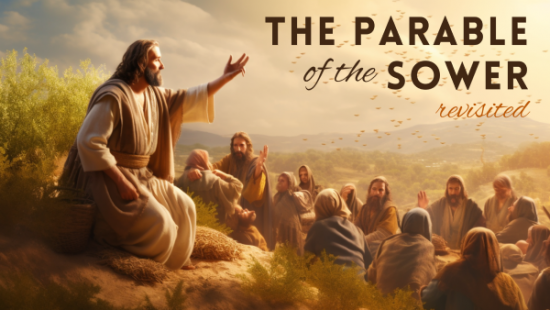
The Parable of the Sower Revisited
The parable of the sower is a wonderful story that Jesus tells about the power of throwing seeds and preparing the soil of our hearts (Matthew 13:1-23). In the parable there was a farmer sowing seeds. He seemingly throws his seed indiscriminately among different types of soils. We should note that there is power in the seed no matter where the seed lands, but life is more readily released when it lands on good soil.
But if there is power in the seed, we should take a closer look at what the seed is. We often take the seed as meaning the Gospel. The Bible states it as the message of the kingdom (Matthew 13:19). The message of the kingdom is much broader than just the salvation message. Many of Jesus’ parables start, “the kingdom of heaven is like…”. This is the message of the kingdom. He wants us to know the message of the kingdom so that His kingdom will take root in our lives and we will resemble His kingdom.
Our Enemy Understands This Parable
Interestingly, our enemy comprehends the profound wisdom encapsulated within this parable. We catch a glimpse of his understanding when we examine how he snatches away the seed that falls upon hardened ground. He recognizes the power residing in the seeds that take root, and since he can’t remove seeds already in the ground, he resorts to sending trouble, persecution, worry, and lies to stifle their growth.
What often eludes our attention is that our enemy leverages this principle to plant his own seeds within our lives. He knows that if he can infiltrate our soil, his kingdom will begin to overshadow God’s kingdom. Merely removing God’s seeds doesn’t satisfy him; he strives to introduce his own destructive seeds into our fields.
The Seed In This Parable Are Thoughts
The enemy is constantly feeding us lies in hopes that some of his seed will find soil to grow. Like the farmer in the parable, the enemy does not throw seed sparingly. This is why we are to take all of our thoughts captive and think on whatever is excellent and praiseworthy (2 Corinthians 10:5 & Philippians 4:8). These thoughts become our behaviors (James 1:15).
Jesus adds to the discussion of seeds by telling the parable of the weeds (Matthew 13:24-43). He says the enemy comes into His fields to scatter weeds. While Jesus tells us that this parable is referring to people, the principle is still the same: the enemy is sowing bad seed into our fields.
Our Application to the Parable of the Sower
As we contemplate the parable of the sower, we must remember not to be hasty in uprooting the weeds, for in doing so, we may unintentionally remove some valuable crops. We often focus on eradicating sin from our lives and the lives of those we guide, forgetting that we may inadvertently discard the good harvest as well. Sin is often a byproduct of evil desires or negative thoughts, and eliminating sin alone doesn’t nullify the power of the seed.
The Holy Spirit assumes the role of convicting us of sin. As we journey alongside our friends and disciples, as they love Jesus and pursue Him, we must trust the work of the Holy Spirit while we sow good seed. The truth is what sets us free, so we need an abundance of good seed to counteract the effects of the bad seed. Lies are replaced by truth. Evil succumbs to good. Fear dissipates in the presence of love.
Let us, then, venture forth and sow the message of God’s kingdom. In every circumstance, let us speak the language of God’s love. In every conversation, may we speak only what is helpful for building others up according to their needs, that it may benefit those who listen. This is how we sow good seed.